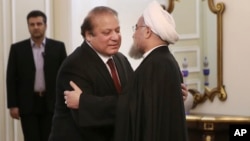Iran’s President Hassan Rouhani visits neighboring Pakistan for two days starting Friday. The trip is apparently part of Iran's diplomatic campaign to boost economic and trade ties with neighboring and regional countries now that international sanctions against it have been removed.
Pakistani and Iranian officials say the sanctions had for years prevented the two countries from expanding economic relations and slowed progress on efforts to import Iranian natural gas to meet rapidly growing needs in energy-starved Pakistan.
Pakistan's Foreign Ministry spokesman, Mohammed Nafees Zakaria, said President Hassan Rouhani’s visit, his first to the country since taking office, offers an opportunity to conclude pending agreements and move bilateral relations forward.
“This visit is taking place at a very important juncture and time when the sanctions on Iran have been lifted," he said. "… High on the agenda would be the economic relations and the leadership on both sides are very keen to actually add economic content to the bilateral relations.”
Officials expect exponential growth in trade and economic relations in coming months. Bilateral annual trade currently stands at around $250 million and there are plans for a five-year road map to increase it to $5 billion a year.
During the visit, Rouhani is expected to discuss a pipeline project for transporting Iranian natural gas to Pakistan.
Iranian officials say the pipeline on their side is largely completed. Pakistani officials, however, blame economic sanctions against Iran for preventing work on their side, although they now vow to begin construction soon.
The international sanctions alone have not stopped Islamabad from improving ties with Tehran.
Sanctions not the only hurdle
Critics believe Pakistan does not want to upset Iran’s rival, Saudi Arabia, with which it has deep political and economic relations. The Sunni Arab nation enjoys respect and popularity in predominantly Sunni Muslim Pakistan.
In recent years, Riyadh has provided Islamabad with critical financial assistance and oil on deferred payments to support Pakistan’s troubled economy and shore up its critically low foreign exchange reserves.
Pakistan is close to Saudi Arabia but that does not mean it is hostile to Iran, said analyst Masood Khan, who heads Islamabad’s Institute of Strategic Studies.
“I don’t think there is a competition in the two sets of relationships that we have with Saudi Arabia and Iran," he said. "There are tensions from time to time that emerge and we try to resolve them. In fact, it is our sincere desire that this tension between Saudi Arabia and Iran should go down.”
The rivalry between Saudi Arabia and Iran has recently deepened the sectarian divide between Shi’ite and Sunni Muslims and fueled tensions across the Middle East.
The confrontation prompted Pakistani Prime Minister Nawaz Sharif to travel to Saudi Arabia and Iran in January to try to reduce tensions between the two countries. Pakistani military chief General Raheel Sharif accompanied him.
Pakistan, having the largest and only nuclear-armed army in the Muslim world, last year refused to join a Saudi-led Sunni coalition to fight in Yemen against Iranian-backed forces. It said Islamabad would not join forces with any alliance against Tehran.
The move angered Riyadh, although Islamabad vowed to stand ready to respond to any attack against Saudi Arabia.
Parting ways on Afghanistan
Iran's Rouhani, in his meetings with Sharif and other Pakistani leaders, is also expected to review peace efforts in Afghanistan, which shares long borders with both countries.
Iran and Pakistan have long supported rival Afghan factions in the conflict-torn nation, which has often caused tensions in diplomatic ties, although they now openly support internationally-led efforts aimed at ending the Afghan conflict.
In a message to Pakistani media ahead of his arrival in Islamabad, Rouhani noted that “long borders of the two countries could be a constrictive element in strengthening mutual relations more than ever.”
He added that it is important for Pakistan and Iran to establish better cooperation because it will facilitate the economic growth of other regional countries and give them access to Iran’s oil and gas resources. He said that would go a long way in reducing regional tensions.




